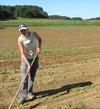Matthew 20:1-16 took on new meaning for me this week. Though I heard it read within the walls of a church on Sunday, the story took me out to the fields where I spend my day laboring.
In this passage, day laborers agree to a fixed price for their wage to work in a vineyard. The landowner then goes periodically through the day to the marketplace where more laborers are waiting to be hired. At the end of the day, those who had been hired last, and worked only an hour, were paid first, and paid the same amount as those hired at the start of the workday. Those who were hired first were paid last, and of course, complained that the equity in wages was not fair, since they had worked many more hours. The landowner answers, “Friend, I am not being unfair to you. Didn’t you agree to work for a denarius? Take your pay and go. I want to give the man who was hired last the same as I gave you. Don’t I have the right to do what I want with my own money? Or are you envious because I am generous?”
I would be envious. I know what it is like to work a full day in the sun. Although I don’t work on one of the vineyards here on the North Fork of Long Island, I still spend the majority of time at the farm harvesting vegetables each day. And I would feel wronged if someone who worked a fraction of my hours was given the same wages.
But Jesus ends this parable by saying, “The first shall be last, and the last shall be first.”
I am used to being first. I come from a privileged background where my white skin, US citizenship, and prestigious education facilitate that I am in situations of power. I would be among those first chosen from the marketplace: a reliable worker worthy of full wages.
And what about those chosen last? Maybe those workers are the Latino immigrants who work on so many farms, including mine, who struggled to get across the border to find any decent work they could, even at the ninth hour of the day, to earn a fair wage to support their families. Whether from Mexico or Guatemala or Texas, these men work just as hard as those of us hired first.
This isn’t quite the Reindom of God, so maybe they aren’t paid exactly the same. But farm work, like God, is a great equalizer. We come from divergent backgrounds: class, race, gender, education divide us. But our work transforms the expected relations between us. These men, so competent in their work, teach me how to use a circle hoe and pick beets correctly. They can weed twice as fast as I can and harvest arugula three crates to my one crate. I am no longer first.
Surely, the Reindom of God looks something like this: a 23-year-old Caucasian woman and a 17-year-old Mexican boy kneel in the same bed of radishes, the same dirt under their fingernails, the same task undertaken. They teach each other the English and Spanish word for the food they are unearthing, simultaneously unearthing a new sense of mutual respect, enjoyment, and equality.
—————–

Alexandra Buck is a novice apprentice at an organic working farm on the
North Fork of Long Island, New York. She served as Young Adult Intern
at the Presbyterian United Nations Office 2007-2008 before making the
move to get her hands dirty at the farm. She loves beets as big as your
face, heirloom tomatoes, pumpkin patches, and sustainability.